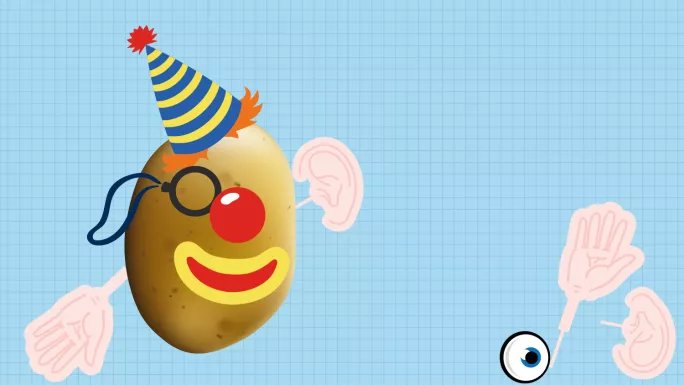- Home
- 25 traits that make a perfect teacher...
25 traits that make a perfect teacher...

Funny: that’s what students want you, their teacher, to be. And they don’t just want you to have a joke in your teaching toolbox to provide some light relief from the drudgery of endless exams. Asked by Tes to list the characteristics that every teacher should possess, more than 3,000 students - from primary, secondary and special schools - said the ability to amuse was not just an important attribute, but something that determined whether a teacher was truly great.
“Funny teachers are more personable and connect with you more,” argues one secondary student in the Midlands. “Because of this, you feel more respected and you feel comfortable going to that teacher with your problems because there’s less pressure”
A primary student in the South West of England believes that humour goes to the heart of effective schooling. “Teachers should be funny because you don’t want kids to think school is too serious and boring,” they say. “It makes the lesson interesting and you want to learn more.”
If you’re reading this in disbelief, then you will not be alone. But the survey was no close-run race: Tes crunched the survey data into a primary list and a secondary list of the 25 most popular answers, and “funny” won by a landslide on both counts.

The other characteristics on the lists are a little more conventional. The survey suggests that both the perfect primary teacher and the superior secondary teacher require a mix of the personal touch (“accepting”, “kind” and “a good listener” all made the cut), and essential teaching skills (“organised”, “knowledgeable” and “fair” also featured). And there was near agreement across the age phases: 18 of the characteristics appear on both lists.
Now, it could be argued that such lists are interesting, but that a teacher should be judged on how well they teach, regardless of how they may act; whether the children learn or not should trump how much a student likes a teacher or how many of the list of 25 traits a teacher can tick off.
Yet the counter argument is that the two are intimately connected. Research is pretty conclusive on the fact that student-teacher relationships are integral to learning, and here is a list that tells you what students believe are the component parts of that relationship.
At a time when pupil wellbeing is under the microscope, and with the desire to maximise the progress of students top of every teacher’s agenda, is it not worth looking more closely at what drives these choices - and perhaps even taking them seriously?
Mixing humour and seriousness
While you might expect the teaching profession to recoil in horror on hearing that students want their classrooms staffed by Peter Kay and Miranda Hart, many teachers were not surprised that a sense of humour featured so highly. For those teachers, being funny is the “human” part of the role.
Clare Erasmus, director of mental health and wellbeing at The Magna Carta School in Surrey, believes wit and humour “help to build the bond between student and teacher”.
Others say that humour is important for diffusing difficult situations and setting an example for how students should behave. David Gower, assistant head of King Edward VI School in Bury St Edmunds, says “being able to mix a lighthearted tone with moments of seriousness helps students to understand how to behave in different situations”.
Another popular view is that humour doesn’t only benefit the student, but the teacher, too. Alice Edgington, deputy head at St Stephen’s Infant School in Canterbury, believes that all teachers should “go home and laugh about your teaching day, whether it’s been a good day or a bad day”. Perhaps students have picked up on workload stress and identified the funny teachers as those who are coping best?

But some educators aren’t buying it. “I’ve worked with excellent teachers who are not in the slightest bit funny, as well as with hilarious performers who couldn’t get their pupils to learn anything,” says John Rutter, headteacher at Inverness High School.
“The ability to have a laugh is important in creating a classroom atmosphere that’s conducive to learning, but may be more important in the minds of pupils than it is in promoting real educational gains.”
Julian Dutnall, headteacher at Frances Bardsley Academy, thinks “there are some dangers if teachers try to be funny to win popularity and then struggle to maintain discipline or objectivity”.
When you work your way down the list, you also begin to see how “funny” might contradict other sought-after characteristics. For example, sarcasm may be a way of showing humour, but it can also be considered disrespectful; “respectful” came 16th on the primary list and 11th for secondary. “There is a fine line between sarcasm that is mutually considered amusing and quick-witted, and sarcasm that is belittling and publicly humiliating,” concurs Erasmus.
Funny is not the only aspect of the list that causes confusion. Most of the teachers involved in the survey thought the list their students had come up with was fair, but there were concerns about prioritisation and noticeable missing elements.
For example, “respectful” ranked relatively low, but many teachers assert that being respectful can be the key to engagement and great teaching. “As a secondary school teacher, I think that respect for secondary students is a significant part of their development into being young adults,” says Sean Sycamore, deputy head of Comberton Village College in Cambridgeshire.
Also noteworthy was the fact that certain qualities appeared on one list, but not the other. “I’m surprised that ‘strict at the right time’ only appears on the primary list of words,” says Gower. “I think it’s important for secondary school teachers, too. Strict often has negative connotations, but I think students like a teacher to establish clear expectations of behaviour and to be consistent in the way that they deal with these.”
Indeed, direct reference to behaviour management does not appear at all on the secondary list, but there are characteristics such as “patient” and “gives chances”, which suggest a less-than-total-obedience model is what older students desire.
As for what else is missing, Erasmus lists some qualities she feels definitely deserve a place: “I might add: consistent; flexible; a growth mindset; authentic. I also think teachers need to be able to acknowledge their mistakes.
Serious consideration?
Of course, what the teachers think of the list is a different question to what they think should be done with it. It is easy to pat students on the back and say “very interesting”, but should we take their thoughts on what makes a great teacher seriously?
“Our students are our best judges and they know what great teaching is,” argues David Barrs, headteacher at Anglo European School. “Being challenged to put it into words has given them the language they need to help them recognise it when they see it.”
That, presumably, is a yes.
Research also suggests that we should listen to our pupils: studies have found that students have unique perspectives on their own learning and these insights can create positive change if adults respond appropriately.
“Dialogue between teachers and students is essential to the most engaging and effective teaching and learning,” says Alison Cook-Sather, professor of education at Bryn Mawr College in Pennsylvania, US.
Dana Mitra, professor of education theory and policy at Penn State College of Education, adds that “student-voice initiatives improve classroom practice”.
“Students can improve academically when teachers construct their classrooms in ways that value student voice - especially when students are given the power to work with their teachers to improve curriculum and instruction,” she adds.
However, others are wary. “We should listen to children and they should have a voice, but ‘pupil voice’ needs to be approached with caution,” says Peter Worley, chief executive of the Philosophy Foundation. “Pupil voice should not be treated uncritically. We need to encourage children to voice their opinions while ensuring that what they say is still open to critical scrutiny from their peers.”
And Kevin Courtney, general secretary of the NUT teaching union, says that using the list as some form of “checklist” would not be welcomed. “[The survey] highlights the importance of the pastoral role of teachers, and that teaching is about far more than simply imparting knowledge to children and young people,” he says. “However, converting this into a tick-list for training or inspection would not be welcome. Indeed, the idea of Ofsted inspectors judging whether a teacher is ‘funny’ simply doesn’t bear thinking about.”
Yet, interestingly, there is evidence that some of the characteristics are already a factor in teacher selection.
“We aim to attract the best and brightest into classrooms, and we look for a range of qualities based on international evidence of what makes the most effective teachers,” says Teach First executive director Sam Freedman. “But actually there is some crossover with what these young people identify and our focus on communication, problem-solving, knowledge and planning.”
Sue O’Brien, head of academic development at the Sheffield Institute of Education, adds that “ITT courses are designed with the Teachers’ Standards (2013) at the heart of them and…they do emphasise that trainees must ‘demonstrate consistently the positive attitudes, values and behaviour which are expected of pupils’.”
Many of these positive attitudes were recognised by the students in their choices: being fair, understanding and supportive.
“Of course, it is difficult to select for these, but, through references and interview tasks, we do look for these characteristics,” she says.
But O’Brien adds that trainers look for other things when recruiting, too: resilience, for example, which does not feature on the list. Students may not immediately recognise characteristics such as these in the classroom, but they’ll certainly notice if they’re missing.
If a candidate came through the door lacking resilience, there are emerging theories of how it might be taught to them. But let’s say we took our lists seriously - could we ensure teachers possess all of these qualities? Could you teach someone to be funny?
Some argue that you can. “Professional comedians typically become funnier with experience and improv comedy schools teach people to become better improvisers,” says Peter McGraw, marketing and psychology professor at the University of Colorado Boulder, US, and director of the Humor Research Lab. “Research reveals that people can improve other skills, such as mindfulness, communication ability and compassion.
Similarly, Bill Lucas, director of the Centre for Real-World Learning at the University of Winchester, believes that most of the other attributes students have chosen can be taught.
“All of the attributes are learnable to some extent, but given that trainee teachers are adults, those that are more about personality are inevitably harder to change,” he says.

Such efforts to train teachers would require strong evidence that these characteristics do make a difference - ITT programmes are notoriously crammed already. But while there is plenty of research to say student-teacher relationships are important, proof of what goes into productive teacher-student relationships is scarce.
“I don’t think there’s much research on [forming student-teacher relationships],” says Dylan Wiliam, emeritus professor of educational assessment at the UCL Institute of Education. “It’s really more about being a decent human being.”
Without such evidence, you could argue the lists should remain of interest, but not of instructional value.
Yet taken together, what the lists really describe is exactly what Wiliam instructs his students to be: a decent human being. In a system so intent on taking emotion out of schooling and replacing it with cold, hard data, it’s too easy to lose sight of the humanity that makes being a teacher great - and that also makes great teachers.
What these lists represent is a reminder (and permission) to embrace that side of yourself once again. And for that, it is worth taking them very seriously indeed.
Primary pupils’ ranking
We asked students to list the characteristics that every teacher should possess
1. Funny
2. Helpful/supportive
3. Good listener
4. Friendly
5. Fair
6. Approachable
7. Kind
8. Passionate
9. Inspiring
10. Knowledgeable
11. Patient
12. Organised
13. Fun
14. Rewarding
15. Trustworthy
16. Respectful
17. Happy
18. Understanding 19 Creative
20. Genuine
21. Believe in you
22. Reliable
23. Good at explaining
24. Strict ‘at the right time’
25. Generous
Secondary pupils’ ranking
We asked students to list the characteristics that every teacher should possess
1. Funny
2. Fair
3. Understanding
4. Helpful/supportive
5. Good listener
6. Inspiring
7. Knowledgeable
8. Patient
9. Passionate
10. Fun
11. Respectful
12. Good speaker
13. Trustworthy
14. Confident
15. Reliable
16. Approachable
17. Organised
18. Kind
19. Rewarding
20. Friendly
21. Gives chances
22. Accepting
23. Calm
24. Good at explaining
25. Adaptable
Register with Tes and you can read two free articles every month plus you'll have access to our range of award-winning newsletters.
Keep reading with our special offer!
You’ve reached your limit of free articles this month.
- Unlimited access to all Tes magazine content
- Save your favourite articles and gift them to your colleagues
- Exclusive subscriber-only stories
- Over 200,000 archived articles
- Unlimited access to all Tes magazine content
- Save your favourite articles and gift them to your colleagues
- Exclusive subscriber-only stories
- Over 200,000 archived articles



